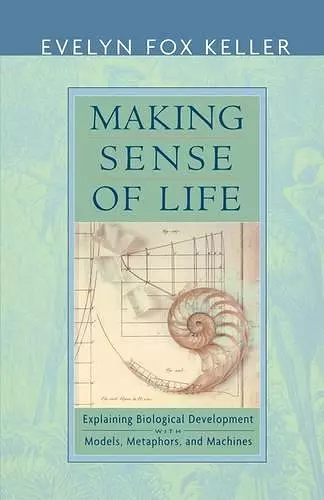Making Sense of Life
Explaining Biological Development with Models, Metaphors, and Machines
Format:Paperback
Publisher:Harvard University Press
Published:30th Nov '03
Currently unavailable, and unfortunately no date known when it will be back

A terrific book full of thought-provoking and original ideas and observations. Keller's discussion of "explanation" in the life sciences is easily one of the very best and most interesting treatments of this topic that I have ever read. -- Jim Woodward, J.O. and Juliette Koepfli Professor of the Humanities, California Institute of Technology
A history of the diverse and changing nature of biological explanation in a particularly charged field, Making Sense of Life draws our attention to the temporal, disciplinary, and cultural components of what biologists mean, and what they understand, when they propose to explain life.
What do biologists want? If, unlike their counterparts in physics, biologists are generally wary of a grand, overarching theory, at what kinds of explanation do biologists aim? How will we know when we have “made sense” of life? Such questions, Evelyn Fox Keller suggests, offer no simple answers. Explanations in the biological sciences are typically provisional and partial, judged by criteria as heterogeneous as their subject matter. It is Keller’s aim in this bold and challenging book to account for this epistemological diversity—particularly in the discipline of developmental biology.
In particular, Keller asks, what counts as an “explanation” of biological development in individual organisms? Her inquiry ranges from physical and mathematical models to more familiar explanatory metaphors to the dramatic contributions of recent technological developments, especially in imaging, recombinant DNA, and computer modeling and simulations.
A history of the diverse and changing nature of biological explanation in a particularly charged field, Making Sense of Life draws our attention to the temporal, disciplinary, and cultural components of what biologists mean, and what they understand, when they propose to explain life.
Making Sense of Life is about the importance of recognizing [the] tight connection between the use of language in the social domain and how it produces biological ‘understanding’… The central arguments of Making Sense of Life are made with grace and authority. Those who are unsettled by them, and who wish to take issue with Keller, could not ask for a more accomplished and eloquent adversary. -- Lisa Jardine * New Scientist *
Evelyn Fox Keller, once a mathematical physicist but now primarily a historian of biology, has analyzed the varied attempts of 20th-century biologists to provide an explanation for the nature and origin of life… Keller’s achievement is to historicize 20th-century biological concepts, so that we can begin to see that they are not inevitable, springing directly from a realization of ‘how nature is’, but rather are culturally located, and shaped by complex social forces. -- Steven Rose * The Lancet *
Keller writes beautifully, explains exquisitely, does a really good job of showing how today’s four-dimensional color gene-product-marked embryo pictures, available to all on the Web, have answered most of the old questions…and how they have generated a whole new set: about artificial life, about complex systems and emergence, about what we want to understand development for… I hope she finds a new generation of biology students, as well as historians, who’ll appreciate her subtle thinking; this book makes sense of embryology at last. -- Jack Cohen * Biologist *
A terrific book full of thought-provoking and original ideas and observations. Keller’s discussion of ‘explanation’ in the life sciences is easily one of the very best and most interesting treatments of this topic that I have ever read. -- Jim Woodward, J. O. and Juliette Koepfli Professor of the Humanities, California Institute of Technology
- Nominated for Phi Beta Kappa Award in Science 2003
- Nominated for PROSE Awards 2002
- Nominated for Rachel Carson Prize & Ludwik Fleck Prize 2003
- Nominated for Robert K. Merton Book Award 2004
ISBN: 9780674012509
Dimensions: unknown
Weight: 485g
400 pages